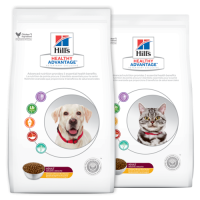
Our veterinarians are dedicated to optimizing your pet’s health in every way. An appropriate, nutrient-dense, and well-balanced diet is important for your pet to live the longest and healthiest life possible. That is why we recommend Hills Science Diet, Purina Pro Plan, and Royal Canin. These diets are formulated by veterinary nutritionists. These are full-fledged veterinarians with additional credentials in nutrition science.
Meeting your pet’s nutritional needs is one of the most important ways to maintain their health and well-being. Deciding which diet is right for your pet can be overwhelming. Read below for some tips on choosing the right food for your furry family member.
Check AAFCO guidelines
Ensuring that your pet’s diet is nutritionally adequate is crucial to their health and well-being. To determine if a pet food meets the necessary standards, look for packaging claims that indicate it has been formulated to meet or exceed the nutritional levels set by the Association of American Feed Control Officials (AAFCO) or that it has undergone AAFCO feeding trials to establish complete and balanced nutrition. These extra layers of protection are found in pet food brands that prioritize quality and safety. It’s important to note that pet foods labeled for “intermittent” or “supplemental” use should not be relied on for long-term feeding unless specifically recommended by your veterinarian. By keeping a close eye on your pet’s nutrition, you can help ensure they lead a happy and healthy life.
Choose the right food for your pet’s lifestyle
Your pet’s nutritional needs are individual to their breed, age, size, species, reproductive stage, and health condition. It is important to choose a diet that is specific to their lifestyle. Ask your veterinarian for additional recommendations on food choices and feeding amounts specific to your pet’s nutritional needs.
READ THE LABELS CAREFULLY
The Link Between Diet & Dilated Cardiomyopathy in Dogs
Over the past several years veterinary cardiologists have seen a significant increase in cases of Dilated Cardiomyopathy (DCM). DCM causes the heart muscle to become weak and thin, leading to irregular heart rhythms, congestive heart failure, or even sudden death. This is a particularly devastating disease as dogs often show no symptoms whatsoever until they are severely or even fatally affected. Initially thought to be related to a taurine deficiency, then to grain free diets, cardiologists have now termed the problematic diets as “BEG” diets:
- “B” stands for boutique diets, or smaller producers, including but not limited to: Blue Buffalo/Wilderness, Orijen, Acana, Taste of the Wild, Fromms, Earthborne, Rachel Ray, raw diets, and homemade diets.
- “E” stands for exotic meats such as elk, bison, salmon, etc.
- “G” refers to grain-free diets.
Diet-related DCM is a new disease process that has yet to be fully understood. Because there is no research supporting the claim that dogs have health issues related to grains in their food, there is no known health benefit to feeding your dog a grain-free diet. Many dogs on “BEG” diets do not have health problems, but our practice has seen several cases of diet-related DCM. Until the connection between heart disease and dog food is better understood, we will continue recommending the following brands only:
- Hills
- Science Diet
- Royal Canin
- Purina Pro plan
- Eukanuba
- Iams
We recommend these brands because they:
- Employ board-certified veterinary nutritionists (veterinarians with an additional degree purely in animal nutrition)
- Conduct and publish research on their ingredients and processes
- Run feeding trials, keeping packs of dogs and feeding them foods for a duration of time and studying the outcomes
If your dog is on a “BEG” diet and shows signs of lethargy, weakness, or exercise intolerance, we recommend bringing them in for an exam as soon as possible. To learn more about diet-related DCM, visit dcmdogfood.com.


